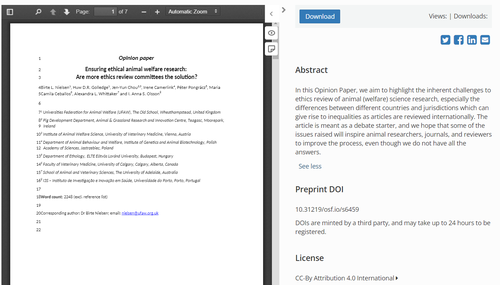
NAWROTH Christian
- Institute of Behavioural Physiology, Research Institute for Farm Animal Biology, Dummerstorf, Germany
- Animal behaviour , Animal cognition, Animal welfare, Open science, Small ruminants
- recommender, manager
Recommendations: 0
Review: 1
Review: 1

Ensuring ethical animal welfare research: Are more ethics review committees the solution?
Can a consensus be reached on the ethical review of animal experimentation for livestock species?
Recommended by Hervé Acloque based on reviews by Christian Nawroth, Patrick Gonin and Leon borgdorf"Ensuring ethical animal welfare research: Are more ethics review committees the solution?" by Birte Nielsen and colleagues [1] provides food for thought on the ethical assessment of experiments involving farm animals. While regulations can provide a precise framework, they differ from country to country and do not consider several cases, mainly when the experimentation involves non- or minimally invasive manipulations. It is also the case when research projects use farmed animals that do not fall within the scope of the regulations on animal experimentation but have undergone practices that can be authorised on farms but may raise ethical questions (tail docking, live castration, tooth filing, beak trimming, dehorning). On the other hand, the heterogeneity of the criteria taken into account by the ethics committees, when they exist (and this can differ greatly from one country to another), do not necessarily correspond to the criteria of the journals, the reviewers and the bodies brought in to evaluate the research project, or to the regulations specific to each country.
All these paradoxes lead the authors to propose solutions, the most straightforward and spontaneous of which is to ask ourselves questions about this issue upstream of the experimental design required to answer a given scientific question. While increasing the number of ethical review committees may be an insufficient option, the authors insist on the importance of improving committee members' training, taking into consideration jurisdictions' differences between countries and spending more time on ethics evaluation during manuscripts' reviewing. In addition, the upstream assessment of research projects by ethics committees, specific to an institution (research institute, universities, companies), a scientific publisher or even a dedicated international ethical review board may also be a good option.
The ethical evaluation of research projects is a question at the heart of our research activities, for which we do not have all the answers. As with scientific reviewing, we must take on the role of evaluator or be evaluated ourselves, using criteria and feelings that are not always consensual. The heterogeneity of evaluation systems within the scientific community, the lack of training for scientists in the fundamentals of ethical evaluation, and the different perceptions of the animal condition between countries and cultures can lead to a reciprocal lack of understanding between evaluator and evaluated, and sometimes a feeling of injustice, as some research may be easy to conduct in one country but difficult in another. Indeed, it is exciting to read the exchanges between the authors and the three reviewers who assessed this opinion paper to appreciate the diversity of points of view and see specific points of divergence.
In addition to animal experimentation, the judgment handed down on 30 June 2023 by the French court penalising a pig farmer for the abusive use of an authorised breeding practice (tail docking) is a perfect illustration of the fact that the ethical assessment of practices and handling of farm animals now extends far beyond the scientific world and is becoming an increasingly important factor in the relationship between society and animal breeding. Failure to consider this evolution, whether in experimentation or animal husbandry, may have legal consequences and increase the lack of understanding between our practices and how society perceives them. The questions raised and the solutions proposed in the article by Nielsen et al. are central to our concerns, not only for the scientific community but also to meet the expectations of all stakeholders.
Finally, although the authors do not directly address the question of genome editing and research using edited farm animals, this is and will be at the heart of future issues concerning the ethical evaluation of research projects. As with practices and manipulations, the intentionality of the modifications induced leads us to question and evaluate, in farmed species, their consequences on animal welfare and their relevance to society and the development of more sustainable and socially accepted animal husbandry.
Reference
[1] Nielsen, B. L., Golledge, H. D. R., Chou, J., Camerlink, I., Pongrácz, P., Ceballos, M., Whittaker, A. L., Olsson, I. S. (2023) Ensuring ethical animal welfare research: Are more ethics review committees the solution? OSF Preprints. Ver. 3 peer-reviewed and recommended by Peer Community in Animal Science. https://doi.org/10.31219/osf.io/s6459